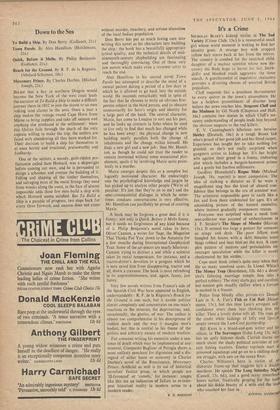Down to the Sea Reach for the Ground. By R.
F. de la Reguera. (Abelard-Schuman, 18s.) BELIEF that a bay in northern Oregon would become the New York of the west coast leads the narrator of To Build a Ship to make a difficult journey there in 1852 to join the dozen or so men staking land claims in the area. Once a year a ship makes the voyage round Cape Horn from Maine to bring supplies and take off salmon and anything else produced at the settlement: when this lifeline fails through the death of the only captain willing to make the trip, the settlers are faced with abandoning all they have worked for. Their decision to build a ship for themselves is at once heroic and irrational, praiseworthy and foolhardy.
One of the settlers, a moody, guilt-ridden per- fectionist called Sam Howard, was a shipwright before coming out west, and he is persuaded to design a schooner and oversee the building of it. Felling and shaping all the timber themselves, and salvaging most of the metal fittings they need from wrecks along the coast, in the face of almost impossible odds these few men build a ship with which Howard seams satisfied. But To Build a Ship is a parable of progress, two steps back for every three forward, and suocess does not come
without murder, treachery, and serious alienation of the local Indian population.
Don Berry has put as much loving care into writing this novel as his characters into building the ship: the book has a beautifully appropriate lyrical quality, and the technical details of mid- nineteenth-century shipbuilding are fascinating and thoroughly convincing. One of those very few novels which make even a reviewer sorry to reach the end.
Alex Hamilton in his second novel Town Parole has attempted to describe the mind of a mental patient during a period of a few days in which he is allowed to go back into the outside world. He succeeds remarkably well in spite of the fact that he chooses to write an obvious first- person subject in the third person, and to obscure unnecessarily his hero's origin and identity for a large part of the book. The central character, Maxie, has come to London to sort out his past, and he looks up contacts in Soho where he used to live only to find that much has changed while he has been away: the physical change in new building neatly parallels both the change of inhabitants and the change within himself. He finds a new girl and a new job: then Mr. Hamil- ton, as though he could not trust the reader to remain interested without some sensational plot- element, spoils it by involving Maxie quite point- lessly in a murder.
Maxie emerges despite this as a complex but logically motivated character. He endearingly uses the psychological knowledge and jargon he has picked up to analyse other people ('We're all peculiar. It's just that they're on to me') and the semi-consequential dialogue in which he some- times conducts conversations is very effective. Mr. Hamilton can justifiably be proud of creating Maxie.
A book may be forgiven a great deal if it is funny: not only is Quick, Before it Melts funny, but it needs no forgiveness of any kind because of it. Philip Benjamin's novel takes its hero, Oliver Cannon, a writer for 'Sage, the Magazine That Thinks For You' down to the Antarctic for a few months during International Geophysical tear. Some of the set-pieces are nearly hilarious: Cannon trying to distract a seal while a scientist takes its rectal temperature, for instance, and a tractor-driver's devotion to a penguin which he is sure saved him from disappearing, tractor and all, down a crevasse. The book is most refreshing in its unpretentiousness, and, again, funny, just funny.
Very few novels written from Franco's side of the Spanish Civil War have appeared in English, understandably: R. F. de la Reguera's Reach for the Ground is one such, but it avoids politics almost completely and concentrates on one man's reactions to the miseries, the deprivations, and, occasionally, the glories, of war. The author is almost too comprehensive in his descriptions of sudden death and the way it mangles men's bodies, but, this is central to his theme of the pitiless and arbitrary nature of modern warfare.
For someone writing his memoirs under a sen- tence of death which may be implemented at any moment, Gianpaolo Baglioni of Perugia shows a most unlikely penchant for digression and a dis- regard of either haste • or economy in Charles Durbin's novel of the Renaissance, Mercenary Prince. Artificial as well is its use of historical novelists' fustian prose, in which people are Ill-favoured' or 'comely,' for instance: usages like this are an indication of failure to re-inter- pret historical reality in modern terms to a modern reader.
B. S. JOHNSON






































 Previous page
Previous page